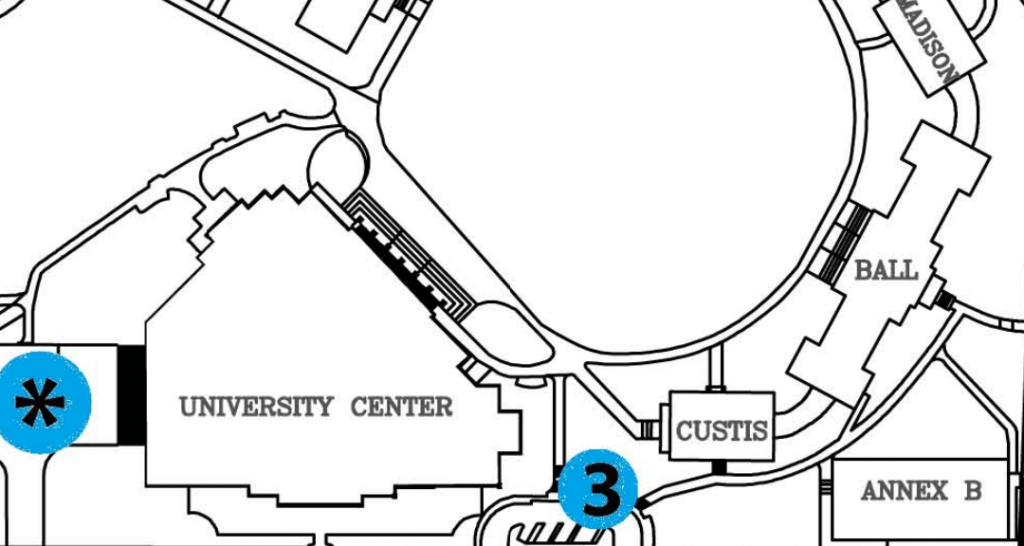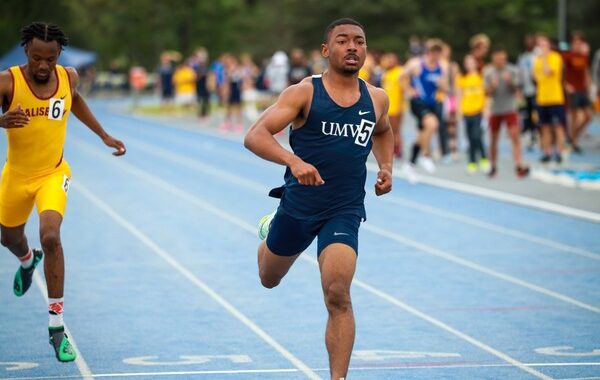Closure of accessible lot limits mobility of students with disabilities
3 min read
The number 3 on the map shows the accessible lot that is currently closed, and Annex B refers to the lot students with mobility issues can use now. | UMW Website
by VICTORIA LARIMER
Staff Writer
On Friday, Oct. 1 the Office of Student Affairs sent out an email announcing that the handicap accessible parking lot in the University Center loop would temporarily be closed for the duration of construction on the new Panera. This parking lot currently serves as the Americans with Disabilities Act compliant parking lot for the University Center, Custis, Ball and Madison. The Office of Disability Resources was not consulted on this decision.
“Parking Management did reach out to us to inform us of the lot closing for three weeks due to the construction. This was after the decision was made,” said Jessica Machado, director of the Office of Disability Resources.
According to Dennis Rapkins of Parking Management, spaces have been set aside for disabled students in the annex parking lot next to the University Center to replace the spots lost.
Following the announcement, several students with disabilities were concerned about the potential issues in campus accessibility this change might pose.
One of these students was junior theatre major, Maddie Neilson.
“The closing of the UC loop takes away essential parking for disabled students who need access to the central part of campus,” she said. “The disabled spots in nearby lots are normally taken by disabled faculty or staff and not available for student use by the time classes start or by lunch when students normally access the UC.”
Senior English major, April Wobken shared a similar concern about the decision to close the University Center loop.
“Them closing off the loop is the worst idea they could possibly do,” she said. “There are already minimal handicap parking spaces on campus. It would have been better if they did whatever they are doing now during fall break or some other break where students will not be impacted.”
Rapkins said that the annex lot where the accessible parking spaces have been relocated is the faculty and staff parking lot located behind Ball Hall to the side of the University Center.
While this new parking location is still relatively close to the buildings that the University Center loop served, there have been concerns about its accessibility.
“It’s hard to get to the UC from the lot. It’s too far away and is out of compliance for disabled students,” said theatre major Meagan Morrison.
When examining the annex lot, the only current accessible path is to exit the lot onto the sidewalk on College Avenue and follow it to the street side entrance of the University Center. From there, these students could through the University Center to access campus walk.
Many students felt that this decision was a part of a broader theme of campus inaccessibility. Junior psychology major Cralida Staton spoke on her personal issues with getting to classes on campus.
Staton said, “My physical accessibility has been quite difficult at times. When I used to have a handicap parking pass, it got me closer to an exit or to the end of the parking lot, but it never really helped with getting to classes. I was told to just drive to the parking lot in front of each building for every class, which took more than ten minutes in between each class.”
Neilson also shared that she had difficulty accessing her classes on campus.
“There is a severe lack of accessibility in general. DuPont, Melchers and Pollard are inaccessible in particular, which sometimes impacts my ability to attend classes,” said Neilson.
The overall lack of on campus accessibility has been and continues to be a concern for disabled students, whether it’s a lack of accessible parking or difficulty accessing buildings.
“My final words on the matter of disability on campus are this: at the end of the day, we just want to be students at UMW, not activists. We want to be able to experience the fun of college like everyone else, not drown in all our attempts to be treated equally,” said Wobken.











